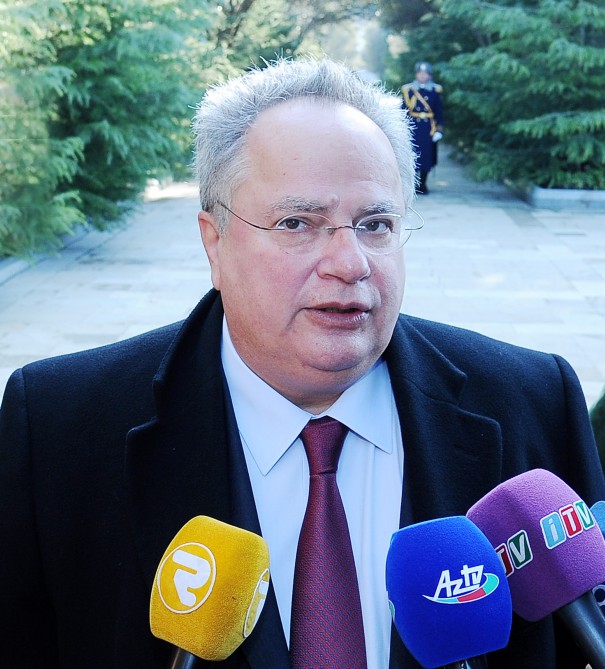Greece desires to receive Azerbaijani gas as soon as possible

By Aynur Karimova
Greece has expressed a desire to get Azerbaijani gas as soon as possible.
The Southern European nation with economic difficulties has assured to have necessary infrastructure for supply of Caspian blue fuel via the multi-billion Southern Gas Corridor.
Nikos Kotzias, the Greek Foreign Minister, who was on a one-day official visit in Baku on February 2, believes that the Trans-Adriatic pipeline, a part of Azerbaijan-initiated giant Southern Gas Corridor, will play a crucial role in Europe’s energy security.
He expressed confidence at a meeting with Azerbaijan's Energy Minister Natig Aliyev that the Azerbaijani gas will be supplied to Europe via TAP "in the nearest future."
The Southern Gas Corridor project envisages the transportation of the gas to be extracted from the giant Shah Deniz field in the Azerbaijani section of the Caspian Sea. Shah Deniz Stage 2 gas will make a 3,500 kilometer journey from the Caspian Sea into Europe. This requires upgrading the existing infrastructure and the development of a chain of new pipelines.
The existing South Caucasus Pipeline will be expanded with a new parallel pipeline across Azerbaijan and Georgia, while the Trans-Anatolian pipeline will transport Shah Deniz gas across Turkey to join the Trans-Adriatic Pipeline, which will take gas through Greece and Albania into Italy.
However, the smooth implementation of the Southern Gas Corridor project is very important for the development of energy cooperation between Greece and Azerbaijan. "Greece’s support for the construction of TAP is very important, because Azerbaijani gas will not be supplied to Europe unless the pipeline is ready," said Aliyev.
“Therefore, the timely implementation of the project will be effective for all sides,” he added.
The Southern Gas Corridor is set to change the energy map of the entire region, connecting gas supplies in the Caspian to markets in Europe for the very first time.
The first gas supplies through the corridor to Georgia and Turkey are given a target date of late 2018. Gas deliveries to Europe are expected just over a year after the first gas is produced offshore in Azerbaijan.
Today, despite the drop in oil prices, the implementation of projects on expansion of the South Caucasus Pipeline, construction of the TANAP and other work on Southern Gas Corridor are underway.
"Some 50 percent of the work on the Shah Deniz 2 project has been completed. Eight of 26 planned production wells have been drilled," the Azerbaijani minister noted.
Aliyev believes that the works under the project will not be suspended and the project will be completed on time.
DESFA
Greece, which is trying to concentrate on the development of strategic projects that will bring dividends in the future, hopes for rapid settlement of the issue concerning SOCAR’s deal to purchase a share in the Greek gas operator DESFA.
The privatization of Greek natural gas transmission manager, DESFA, is profitable both for Greece and Azerbaijan: it plays a crucial role in the realization of major pipeline projects, including the TAP and Greece-Bulgaria Interconnector.
It would bring subsequent investments to the Greek budget from Azerbaijan’s energy giant SOCAR, which agreed to pay 400 million euros to buy a 66 percent stake in the company.
The sides also discussed the issues related to holding the second meeting of Advisory Board of the Southern Gas Corridor project in late February.
Fruitful cooperation
As part of the visit to Baku, the Greek FM held a meeting with his Azerbaijani counterpart Elmar Mammadyarov.
Following the bilateral talks, Mammadyarov said at a briefing that besides energy sector, Greece and Azerbaijan also enjoy fruitful cooperation in other fields.
“We have discussed a number of issues on bilateral and regional cooperation during the meeting with my counterpart,” he noted. "Issues of energy cooperation and cooperation within the framework of the EU were also on the agenda of the talks."
Future ties
Kotzias, who led a Greek delegation, also was received by Azerbaijani President Ilham Aliyev, and the sides expressed interest in further strengthening bilateral relations between the two countries.
Azerbaijan and Greece have a long history and unique culture,
and the two peoples share a number of common values. In this
regard, the two countries should effectively use this potential for
further boosting the ties, according to Kotzias.
They also exchanged views on the development of bilateral ties
between the two countries in a variety of fields, in particular,
the settlement of the Armenian-Azerbaijani Nagorno-Karabakh
conflict.
“Greece supports peaceful settlement of the Nagorno-Karabakh conflict," Kotzias told journalists as part of his visit.
Nagorno-Karabakh emerged as result of Armenia's territorial claims on Azerbaijan in 1988. More than 20,000 Azerbaijanis were killed and over 1 million were displaced as a result of the large-scale hostilities. Since the war, Armenian armed forces have occupied 20 percent of Azerbaijan's territory, including Nagorno-Karabakh and seven surrounding regions. Armenia continues the occupation in defiance of four UN Security Council resolutions calling for immediate and unconditional withdrawal.
--
Aynur Karimova is AzerNews’ staff journalist, follow her on Twitter: @Aynur_Karimova
Follow us on Twitter @AzerNewsAz
Here we are to serve you with news right now. It does not cost much, but worth your attention.
Choose to support open, independent, quality journalism and subscribe on a monthly basis.
By subscribing to our online newspaper, you can have full digital access to all news, analysis, and much more.
You can also follow AzerNEWS on Twitter @AzerNewsAz or Facebook @AzerNewsNewspaper
Thank you!
